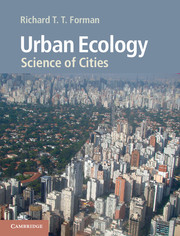Epilogue
Published online by Cambridge University Press: 05 June 2014
Summary
One by one they stopped and gasped at the sight that lay beneath them. Millions of stars seemed to have fallen from the sky to land on the Earth far below. It was the lights of the city! Giant buildings crowded into the evening air. Rumblers roared along paved roads. As far as the eye could see the city spread itself over the land. Where were the trees? The birds? The flowers? … The healing tree, the creek, it’s all gone.
Garry Fleming, Bollygum, 1995There are many themes in nature’s symphony, each with its own pace and rhythm. We are forced to choose among these, which we have barely begun to hear and understand.
Daniel B. Botkin, Discordant Harmonies, 1990Following our journey through the rich patterns, delights and surprises in urban ecology, let us reflect, even speculate, a bit. I have chosen a handful of themes to explore that seem to be of particular interest and importance now and for the future. Let us consider urban ecology and the (1) distributions of aggregated people; (2) greenspaces and park system; (3) habitat heterogeneity and biodiversity; (4) tight urban water system; (5) ecological l ows and urban networks; (6) urban change; and (7) societal goals and applications of urban ecology. In rel ecting on these big subjects, my goal is to crack them open enough to catalyze further and useful pondering for scholars and for society.
- Type
- Chapter
- Information
- Urban EcologyScience of Cities, pp. 372 - 378Publisher: Cambridge University PressPrint publication year: 2014



